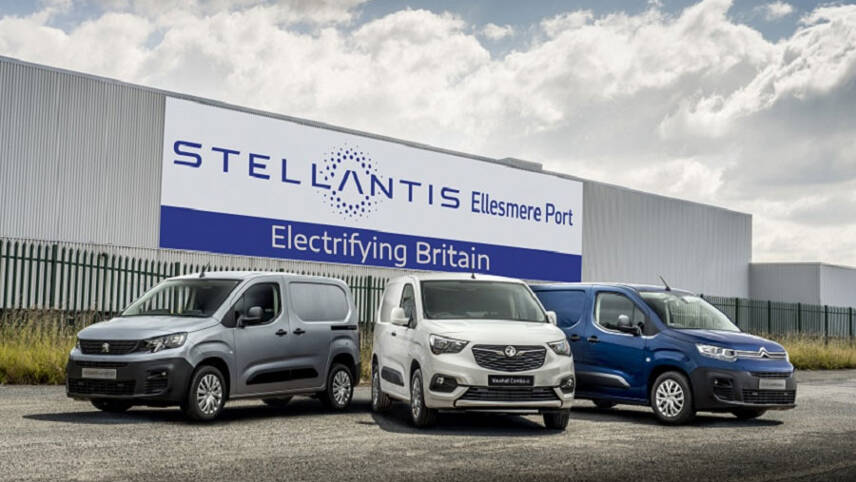Register for free and continue reading
Join our growing army of changemakers and get unlimited access to our premium content

Image: Stellantis
The automaker announced on Thursday (22 February) that it will produce a “limited” run of five electric van models at its plant in Luton from spring 2025. Vehicles will be produced for the UK market and for international sales within the EU.
Stellantis is set to invest £10m in upgrading the diesel van production line at Luton. This will impact not only Vauxhall models but also Peugeots, Citroens and Fiats.
The business already accounts for around half of the UK’s electric van market and makes smaller electric vans at its other UK manufacturing hub in Ellesmere Port. But this marks its first production of larger e-vans in the UK, in a move that provides more certainty over the future of the 92-year-old Luton hub.
Nonetheless, the business has stated that further investment in electric vehicle (EV) manufacturing in the UK will depend upon interventions from the UK Government which could make this a more attractive market than those overseas.
Stellantis is planning to shift to a fully electric lineup of cars by 2030 in Europe, followed by vans later in the decade. But where it will make these cars and vans is yet to be cemented.
Stellantis’s UK lead Maria Grazia Davino said: “Whilst this decision demonstrates [our] confidence in the Luton plant, this first step in its redevelopment towards a fully electric future requires the UK Government to stimulate more demand in the EV market and support manufacturers that invest in the UK for a sustainable transition.”
Policy gaps
Prime Minister Rishi Sunak last year moved the UK’s ban on new petrol and diesel van sales back from 2030 to 2035. To support this change, the Government quickly updated the Zero Emission Vehicle Mandate, which compels automakers to ensure that models with no tailpipe emissions account for an ever-increasing proportion of production.
The Government has also pledged £2bn to British car manufacturing, with a focus on EVs. This funding will become available from 2025.
But carmakers like Stellantis have been calling for a broader and more long-term focus that also addresses issues like rising energy costs, securing skilled workers and competing with subsidies on offer in markets such as the EU and US.
The UK Sustainable Investment and Finance Association’s chief executive James Alexander said: “Stellantis’ decision… highlights the UK’s shaky ground in attracting green investment after government wavering on net-zero commitments unsettled investor confidence.
“The UK has a window of opportunity to take a leadership stance in the technologies of the future, and EV’s are a clear example of an emerging domestic market where production can be ‘onshored’ or we can lose out to other countries who are doing a better job of attracting that crucial investment.
“We must prioritize clear, long-term strategies to unlock the economic potential of the green transition, creating jobs, lowering bills, and boosting energy security. Investors need certainty, and the government’s recent weakening of net-zero targets without clear alternatives paints a concerning picture. We urge them to address these concerns and create an environment that inspires confidence in green investment before it’s too late.”
Despite this uncertainty and with the general election looming, a handful of large automotive players have invested in EV production capacity in Britain in recent times.
That decision came four months after JLR’s parent company Tata Group announced a £4bn investment in a UK-based battery gigafactory. It is understood that the UK Government provided a “significant” subsidy to get this decision over the line.


EVs require certain relatively scarce elements. It would thus be sagacious to ensure that new batteries are only issued on the recycling of the old units.
Waste should, indeed must, be avoided.
Mankind is quite flagrant in its’ “use it and chuck it away” policies, but almost unawaredly.
Iron has been concentrated in the Earths mantle, dug out, used, and largely left to rust, but there it is so dispersed as to be useless.
I have no answer; if only!
The power to charge these vehicles has to be generated somewhere, do we have details of this side of the equation?
The power to charge these vehicles has to be generated somewhere, do we have details of this side of the equation?
Do we have the power station capacity, non-carbon, to achieve this?